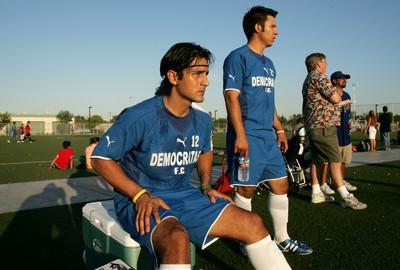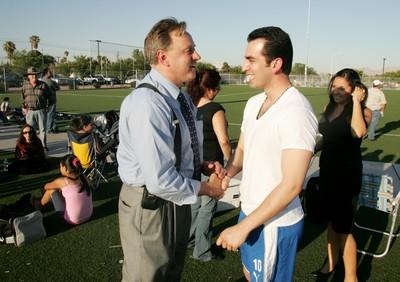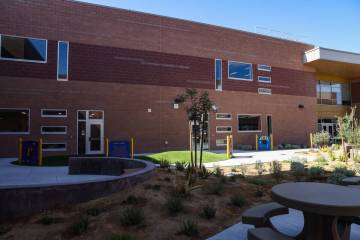Democrats use soccer in outreach to Hispanic community
Early in the first half, things weren't looking great for the Democrats.
Their opponents had them contained, penning their powerful forwards and keeping the ball largely on their side of the field. About 15 minutes in, the other team, Los Escorpiones, scored the first goal.
Not long after, Los Democratas struck back, the lanky Sudanese forward Francis Khamis slamming a sharp shot from the side of the goal into the net. But still, the ball returned to their side, keeping them on the defensive. The game was tied, 1-1.
It's a fast-paced, rough-and-tumble game -- politics, that is.
The Nevada Democratic Party is getting creative. On Thursday night at Fountain Park, they showed off their new soccer team. The effort to reach out to the Hispanic community follows the local amateur soccer scene.
Los Democratas are in the most competitive league in town, and they had a 5-1-1 record going into Thursday's game.
They wear blue jerseys.
Another forward, a former state MVP at Rancho High School, is a member of the state Assembly, Ruben Kihuen, D-Las Vegas. He says the outreach is working.
"Literally every team we've played so far, people see our name and ask us why," Kihuen said. "I'll be in the middle of the game and a defender will ask me, 'Why are you guys the Democrats?' That's the kind of awareness we want to build."
At the game, Spanish-speaking party staffers are trolling the sidelines with clipboards. Are you a citizen? If not, they'll give you a citizenship application. If you are, are you registered to vote? They have the applications for that too, along with information about "nuestra partida," or "our party."
Also working the modest crowd were representatives of some of the presidential campaigns. A distinguished-looking man in his 50s, wearing suspenders and a tie and checkered slacks, was watching intently, cheering, "OK, guys, let's go get a couple!" That's Clark County Democratic Party Chairman and one-time attorney general candidate John Hunt.
Democrats are going all out to get the Hispanic community involved in politics, especially the upcoming early presidential caucus, which could give Nevada a bigger say than ever in who the nominees are.
The effort includes a Spanish Web site, nuestrocaucus.com. There was no word for "caucus" in Spanish, so they imported it and are teaching people what it means. It's pronounced "kow-KOOS."
Julio Flores, 26, the goalkeeper, is from Zacatecas, Mexico but became a U.S. citizen in his teens. Like every other kid from Mexico, he has played and watched soccer for as long as he can remember.
"Being Hispanic, we are fanatics about it," he said. "In school back home, we would watch the World Cup games during class."
The team existed under a different name, and Flores has played for it for three years. He has never really been into politics, but now that the Democrats are the team's sponsors, he's been thinking.
"I've never voted before, but now I think the president's made some bad decisions. I think we need a Democrat," he said. "I'm going to vote for the first time next year. I'm going to vote for Mrs. Clinton."
Over on the other side, Los Escorpiones were focused on the game.
"They've got some pretty good players," said Joaquin Placido, Los Escorpiones' manager. "I think they've got a solid team."
When he votes, he votes Democratic, Placido said, but Thursday night he was intent on beating Los Democratas.
As for efforts to gear Hispanics up for elections, Hispanic voter registration appears to be increasing rapidly in Southern Nevada. According to the Clark County Election Department, as of November's election, there were 69,993 active registered voters with Hispanic last names. As of Thursday, there were 75,874, an increase of almost 6,000 in just nine months.
The question, as always, is whether they can be mobilized.
Many see the Hispanic vote as historically not fulfilling its potential in terms of electoral clout. The Hispanics who are eligible to vote generally don't register or turn out as much as other ethnic groups.
That's true, but changing, said Gary Segura, a political scientist at the University of Washington and senior researcher for Latino Decisions, a new project that aims to survey Hispanic voters in states where they are a major presence.
"Latino participation has been climbing and climbing steadily, to the point where their votes are sufficient to tip the outcome in places like Nevada," Segura said.
A new poll of Nevada Hispanics, conducted late last month by Latino Decisions, found them to be trending strongly Democratic.
Of the representative sample of 400 registered Latino voters surveyed throughout the state, 24 percent were registered Republicans, 58 percent Democrats. The poll carries a margin of error of plus or minus 4.9 percentage points.
Moreover, when asked their party affiliation, only 17 percent told interviewers they were Republicans. That means even some Hispanics who've registered with the GOP no longer want to associate themselves with it, Segura said.
Just 9 percent of those surveyed said they were strong Republicans, while 36 percent called themselves strong Democrats.
Segura said the Hispanic vote could be the key to winning Nevada for the Democrats in next year's presidential election. He pointed to the 2004 election, in which President Bush beat Sen. John Kerry, D-Mass., by about 22,000 votes in Nevada.
According to exit polls, Hispanic voters liked Bush, whose policies on immigration are more liberal than his party's base. As much as 40 percent of Hispanics voted Republican in that election, the polls found.
But Republicans alienated many Hispanics with the recent immigration battle in Congress; Segura's poll found most blamed the collapse of proposed compromise immigration legislation on Republicans.
In addition, Hispanics overwhelmingly oppose the war in Iraq; in the Nevada poll, 77 percent favored either immediate withdrawal or beginning withdrawal.
If the Hispanic vote in Nevada continues to grow and continues to turn toward the Democrats, Segura said, "it could be enough to provide 20,000 switch votes. It could be enough to provide (Democrats) the margin of victory," even if no other voters change their minds.
Alas, if Thursday night's game was to be a metaphor for the election, it didn't settle anything. It ended in a 1-1 tie.
"You win some, you lose some, and you tie some," Kihuen said ruefully as he came off the field, nursing a twisted ankle.
Maybe in soccer. But elections don't end in ties.


















